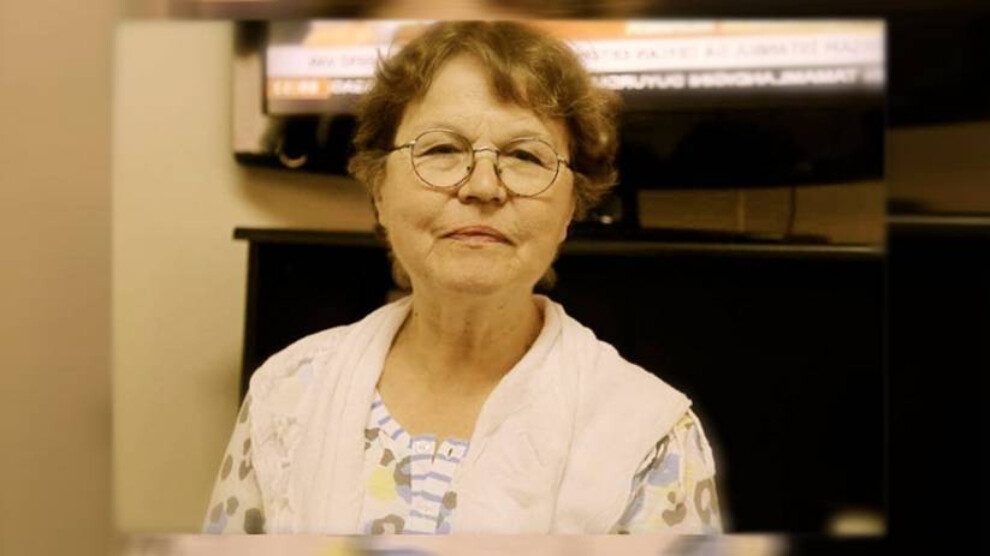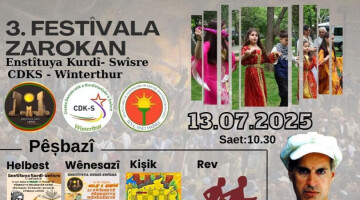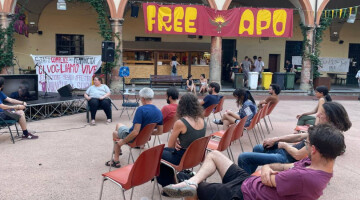Turkish TV Presenter Didem Arslan Ylmaz removed a woman named Türkan Taşçı, who was on the phone from Urfa to Show TV show ‘Didem Arslan Yılmaz’la Vazgeçme’ [Do not give up] immediately after she began speaking Kurdish, and remarked, ‘This is the Republic of Turkey. We don't know this eastern language." The host's anti-Kurdish tone and intolerance sparked reactions. It’s not the first time the Kurdish language has been discriminated against. The "unknown language" in parliament, "unsuitable for pedagogy" in school, racist attacks on the street and in all aspects of life, and the pressure on the Kurdish language, which is being investigated in jails, have all reached the level of "ignorance" of identity under the AKP-MHP administration.
Speaking to Jin News Agency on the matter, linguist Necmiye Alpay pointed out that Kurdish identity should be embraced more with linguistic awareness against attacks on the Kurdish language and assimilation policies.
'Respect for mother tongue is one of the minimum conditions of social peace'
Remarking that Didem Aslan contradicted herself on the issue by declaring, "I understand a little bit" about Kurdish on one hand and "This is the Republic of Turkey" on the other, Alpay continued, "I don't think an experienced TV programmer would want to be in such a tangle. This stumbling is merely a symptom of a larger issue. Respect for their mother tongue is one of the bare minimums for social peace; this must be realized immediately. Such concerns will become increasingly more visible unless a program for the socialization of peace is in place. It's like a hidden hand supports intolerance.”
'Kurdishness and Kurdish language are evident realities'
Regarding the politician Muharrem İnce's remark that the Kurdish language “is not fit for pedagogy," Alpay stated, "Kurdishness and Kurdish language are evident realities and, like other truths, they must find a suitable position in education. While this truth should be incorporated into the education of both Kurdish children and all of our children, there is, on the contrary, an attempt to deceive. If there is anything that is unsuitable for pedagogy, it is attitudes and explanations that attempt to conceal reality. The aforementioned practices are evidence that the tendency to respond to the Kurdish problem with the traditional policy of repression has once again prevailed.”
'Such examples will be encountered as official policy resorts to repression'
"After the triumphs of the last twenty years, I don't think that there will be much chance with euphemisms such as the 'Oriental language,' which are now laughable," Alpay said, adding that individual initiatives, such as Didem Aslan's, may persist”. Alpay emphasized that such incidents will become more common if state policy resorts to repression and added “The sole exception to the official policy of oppression and denial was the two and a half-year period encompassing the Resolution Process (2013-2015). Aside from that, the state used force to "deal with" our social problems. We know what happened afterwards.”
'Attacks should be confronted with language awareness’
"Signs of consciousness emerging from the grassroots are perhaps the most effective in combating attacks on Kurdish. For example, when I was writing these words, there was a small-scale Twitter campaign urging people to ‘tweet a Kurdish phrase they know today’. What a lovely sight! If such solidarity grows broad and consistent, it will be a proud solidarity movement,” Alpay said.
'Social peace demands this'
“Whoever denies his neighbour denies himself. We need to exhibit the courage for peace displayed in Spain and Britain together," Alpay stated, adding that one of the most crucial criteria is language peace: “Whatever we are going to fight over, whatever we are going to discuss, we have to argue in terms of peace, in terms of mutual respect. This is the first step in achieving social peace. What could be more ludicrous than telling someone standing in front of us, 'you don’t exist'? Even the phrase 'I don't understand what you're saying' can be said in a respectful and kind manner. That's how we can understand each other," she stated.















